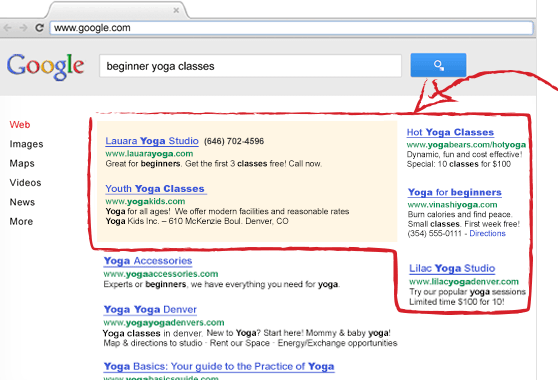*Online Marketing
To rank high in the search engine, how does SEO actually work?

High on Google, how does SEO actually work? Most of the companies we work for realize that this is important. Being in the top 3 for the right keywords is often seen as the most important online marketing goal. This brings in visitors and – if done correctly – new leads.
And new leads are what we’re after. We’re willing to allocate a budget for this, although we still don’t fully understand how it works. SEO is not the same as paid Google Adwords; a high position on Google can’t be bought! So how does it work? In this article, we’ll take a moment to go over the basics and explain what this means for you.
High in Google

Search engines use programs to map the web, known as crawlers or bots. These visit and index websites to then place them in the search engine. The distinction between websites – whether you appear at the top or on page 2 – is determined by the program based on a secret formula. And it’s this secret formula that often makes the whole process unclear. In the early days of search engines, it was all about keywords like ‘mortgage’ or ‘insurance.’ If your site had the right density according to the formula (the percentage of keywords in a text), you would rank at the top. It’s not that simple anymore. So, how does it work now? Let’s briefly discuss various terms:
(In)Links – The number of links to your website used to determine how high you ranked on Google. More links meant better rankings. Nowadays, it’s more about Google’s evaluation of the site linking to you than the quantity of links. Link exchange programs and other techniques are increasingly penalized by Google rather than rewarded.
PageRank – The name is derived from Google founder Larry Page and refers to Google’s rough assessment of a website. Think of Google.com as a 10 and Telegraaf.nl as a 7 or 8. The first version of Google relied solely on this assessment, but over time, several other factors have been added, making PageRank less important.
Reputation / Trust – How many people share a site, and do they stay to read or leave immediately? This evaluation is still in its infancy. The expectation is that search engines will rely much more on your (indirect) network to determine relevant results in the future. Think of the relationship of a relationship. If this person shared an article on social media, there’s a good chance Google will show it to you when you search.
Content – The actual content of your site. Google is becoming increasingly adept at assessing whether your page or article contains valuable information and is adjusting its evaluation accordingly. A content strategy involves producing unique and relevant content on a specific topic or area, making Google view your site as an expert. Consider what value and knowledge you can provide online that your target audience will find useful, rather than focusing solely on yourself.

Google Adwords / SEA – The only paid term in the list. In addition to organic search results – the well-known first 10 results – Google also displays a number of advertisements alongside the search results. This is, by definition, a form of advertising, but one that we see a lot of potential for in many markets.
User-Centric Approach to Search Engine Optimization
Too much information and terminology? Let’s simplify it even more. When you search on Google and land on a new page, how long does it take for you to know if this page is what you’re looking for? Exactly, you know it almost immediately. Search engines are getting better at this with each passing day. So, if we have to sum up the essence of SEO and search engine optimization, it’s this:
Put the user’s experience and trust at the center!
It may sound familiar; it’s putting the customer at the center. We’ve heard this before, and it’s exactly what it’s all about. If your page loads quickly, is easy to read, and contains relevant and unique content, the visitor will stay on the website and may even share it with their connections. Google tracks all of these actions and will, in simple terms, rank your page higher in its results the next time because the next searcher is likely to appreciate the page too!
Top of Google with SEO and Content
So, what do all those SEO specialists actually sell? It can be divided into two camps. One camp is the ‘black hatters’ who specialize in tricks to unfairly boost Google’s rating. Think of buying links and social media shares or certain software that the average visitor will never see. This can yield strong results, but if Google finds out, you can be sure that no one will find you anymore. The other camp is ‘white hat’ and uses only ‘legal’ methods. In our experience, this mostly involves programmers and other specialists who provide the foundation, such as a site that is easily indexable by Google and loads quickly. What do we recommend? We always advise our clients against black hat methods, and white hat methods are important and worthwhile.
In short, using the right techniques and methods is important, but your actual content is essential.
Just as a distinctive positioning starts with a good story, a good position in Google starts with the right content. Especially in B2B, it’s essential that a visitor immediately feels that you know what you’re talking about and that they’ve come to the right place with you. So, forget about the idea that SEO is something someone can do entirely for you without any input from your organization; your organization’s expertise is essential for creating content that Google values highly. The decision you need to make is whether it’s worth investing in a good search engine position or if you can achieve the same with paid Adwords.
Getting Started with Search Engine Optimization
Want to take immediate steps on your own? Keep the following basics in mind:
1. Each page of your site should link to another page on your own site.
2. Link frequently to your most important pages.
3. Don’t just link from your navigation but also from the actual text.
4. Make each section as unique as possible.
5. Make your site as user-friendly as possible; it might lead to more sales.
6. Think about keywords that are important for your market and write about them.
7. Link to other pages too.
8. Find sites that you trust and figure out how you can get featured on them.
9. Keep an eye on your statistics and look for trends.
Want to learn more about online marketing? Read further on our online marketing page.